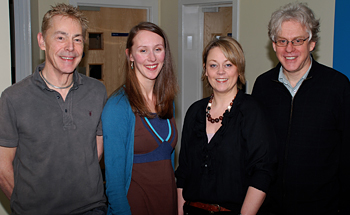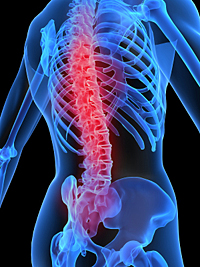Effect of social factors on back pain sufferers
Tue, 23 Apr 2013 14:27:00 BST
Researchers investigate “the influence of the family” on back pain sufferers
 Pictured l-r are Professor Kim Burton OBE, Dr Joanna Brooks, Dr Serena McCluskey and Professor Nigel King
Pictured l-r are Professor Kim Burton OBE, Dr Joanna Brooks, Dr Serena McCluskey and Professor Nigel King
BACK pain is a leading cause of absence from work in the UK, with 4.5 million days being lost every year, at a cost to employers of £335 million, with four out of five Britons suffering from the complaint at some point in their lives.
Researchers at the University of Huddersfield have conducted a sequence of projects investigating recovery from back pain and the problems faced by sufferers when they attempt to return to work. The latest phase of research has broken new ground by focusing on social factors, in particular the influence of the family or “significant others”.
Headed by the psychologists Dr Joanna Brooks and Dr Serena McCluskey, of the University’s Institute of Research into Citizenship and Applied Human Sciences, the project has interviewed both chronic back pain sufferers who have managed to remain at work and those who have been unable to return. Family members were also interviewed and this widens understanding of the issues surrounding recovery from back pain and return to work, according to Dr McCluskey.
 “There has been an acknowledged need for more research of this nature, examining social factors influencing recovery from back pain and not just the individual physical or psychological elements,” she added. “Social factors can play a big role, but that has largely been unexplored so far.”
“There has been an acknowledged need for more research of this nature, examining social factors influencing recovery from back pain and not just the individual physical or psychological elements,” she added. “Social factors can play a big role, but that has largely been unexplored so far.”
The research discovered marked differences between the two groups.
“Those who managed to stay at work had greater flexibility in their jobs – more professional occupations with more autonomy” said Dr McCluskey. “This type of work appeared to be very important – it seemed to help them manage their back pain condition and they had more support from their employers.”
The researchers found that the family members of those who managed to stay at work were much more independent of each other.
“They were supportive but seemed quite separate; whereas the families of back pain sufferers that weren’t working were very involved in each other’s lives,” said Dr McCluskey.
“You could sense that the family had a strong influence in how they perceived their illness and what they thought about a return to work. Their illness seemed to define their relationship.
“The ones on benefits tended to have other complex situations. Work can be very difficult to maintain and the family members often have illnesses themselves.”
It was also important to note, added Dr McCluskey, that the current economic climate meant that it was not easy for back pain sufferers to find work or retrain for other, more suitable occupations.
Social factors
The researchers aim to draw attention to the role that social factors play in back pain and how families, GPs and employers can play a supportive role in enabling sufferers to return to work.
“For example, if you have got a chronic pain condition and the work is heavy and physical then it is obviously going to be difficult. But there are other things that employers could offer, such as modifications to work or a graded return,” said Dr McCluskey.
 The back pain research projects that she and her colleagues have conducted so far have been funded by the organisation BackCare – formerly the National Back Pain Association – and by the BUPA Foundation.
The back pain research projects that she and her colleagues have conducted so far have been funded by the organisation BackCare – formerly the National Back Pain Association – and by the BUPA Foundation.
Now there is to be further research, backed by the University of Huddersfield’s School of Human and Health Sciences Research and Innovation Fund.
“This will focus on people just starting to present with back pain, going to their GP requesting time off work. We do know that you have got to intervene with back pain patients early. Once they get to a chronic stage it is very difficult for them to return to work,” said Dr McCluskey. “We would like to explore new ways to intervene, using family members to aid the process.”
- The most recent article from this research – Illness perceptions in the context of differing work participation outcomes: exploring the influence of significant others in persistent back pain by the University of Huddersfield researchers Joanna Brooks, Serena McCluskey, Nigel King and Kim Burton appears in the Journal BMC Musculoskeletal Disorders, 14. ISSN 1471-2474. See here for more info.







